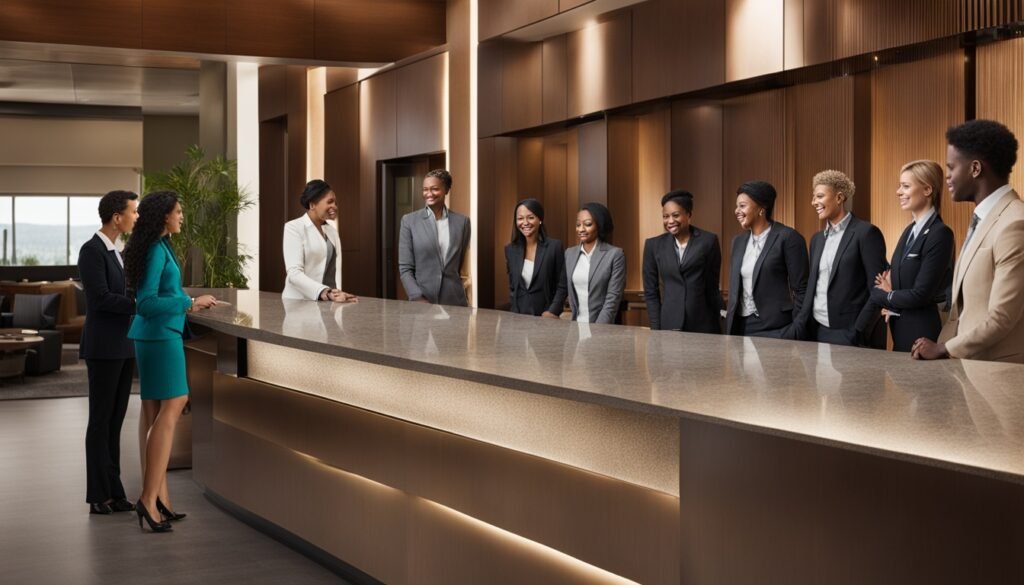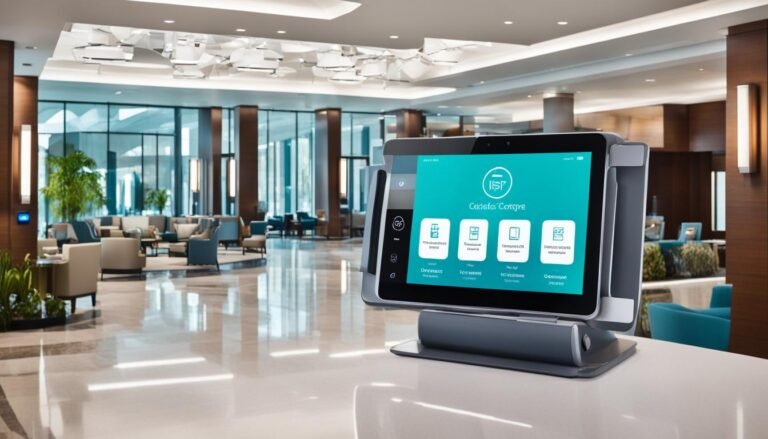Leading with Excellence: Hospitality Leadership Skills
In the quick and ever-changing world of hospitality, leadership is key. Good leaders in hospitality must have specific skills. These skills help them face industry challenges and motivate their teams to provide top-notch service. Join us to learn about the essential leadership skills for a successful career in hospitality management and leading teams.
Picture yourself arriving at a famous hotel, tired from a long trip. You see a receptionist who stands out with her professional and warm approach. Her smile and careful attention immediately relax you.
She asks about your day with genuine interest. She gives tips on local sights and looks after your comfort during your visit. This makes you feel truly welcome and important as a guest.
Such a smooth and welcoming experience is brought about by strong leadership in the hotel. This receptionist does more than her job. She shows what true hospitality leadership is all about.
Key Takeaways
- Effective leadership is crucial in the fast-paced hospitality industry.
- Hospitality professionals need a unique set of skills to inspire their teams and deliver exceptional service.
- The story of a welcoming receptionist sets the stage for understanding the importance of leadership in hospitality.
The Art of Listening and Relationship Building
In the leadership of hospitality, two key skills stand out: listening and building relationships. Abigail Poklar from COSI knows how important they are. They boost leadership in the hospitality world.
Listening is more than hearing words. It’s about really connecting with others and grasping their views. Active listening fills gaps, boosts understanding, and makes team members feel they belong. By listening deeply to what others say, leaders make a space where everyone feels valued and included.
“Listening is more than just nodding your head or waiting for your turn to speak. It’s about genuinely connecting with people and showing them that their thoughts and opinions matter.*”
Creating deep relationships helps leaders in hospitality. This means going beyond just the job. It’s about building real friendships with team members. Doing so makes a work atmosphere positive. It also means spending time to really get to know each person’s strengths. Plus, it’s about helping them grow.
A great leader sees the worth in every team member. They give the help and advice needed for success. With real connections, leaders inspire loyalty and teamwork. This teamwork is key in reaching shared goals.
Learning to listen and build relationships isn’t easy, but it’s worth it. Good leaders make an environment where everyone is respected and inspired to do their best. This leads to great team success.
Key Takeaways:
- Active listening is key for success in the hospitality world.
- Genuine relationships breed trust and respect.
- Investing time in listening and building relationships makes a happy work setting.
| Skills | Description |
|---|---|
| Active Listening | The power to really engage and get others by listening carefully and with understanding. |
| Relationship Building | Creating real bonds with team members that are more than just about the job. |
Understanding Business Nuances and Embracing Hard Work
Joshua Abelson, Co-Owner and General Manager at The Industrial, stands out in hospitality. He says understanding business details and hard work are key for leaders. This is important in the hospitality industry.
Hotel managers need a broad understanding of business. Knowing this helps in making smart choices, facing challenges, and being creative. It’s important to know all the details of the field. This way, leaders can lead through changes and make their businesses succeed.
Abelson says leaders in hospitality need to work hard. They should do more to make sure their business is excellent in every way.
Hard work is really valued in hospitality. Successful leaders work hard to make their guests’ experiences outstanding.
Business understanding also means knowing that success takes time and effort. Leaders in hospitality need to stay strong and keep going even when things are tough. They should help their teams stay motivated during hard times.
Understanding business and hard work helps leaders stand out. They inspire their teams towards success.
Leadership Development Programs for Hospitality
| Program Name | Description |
|---|---|
| 1. Hospitality Leadership Academy | This program teaches all about leadership in hospitality. It includes business skills, strategic thinking, and managing people. |
| 2. Hospitality Leadership Institute | This program is for better leadership in hospitality. It teaches communication, solving problems, and decision-making. |
| 3. Executive Leadership Development Program | This is for top leaders in hospitality. It gives them extra training in leading, managing changes, and being innovative. |
| 4. Hospitality Leadership Mentorship Program | This pairs new leaders with experienced ones. It gives much-needed advice for personal and work growth. |
These programs help managers and professionals in hospitality get better skills. They help them improve as leaders and support the industry’s success.
Upholding Standards and Accountability
Being leaders in the hospitality world means setting and keeping high work quality standards. Michael Hogan, the Chief at The Renaissance Cincinnati, says it’s vital to stick to these standards. This makes sure services are top-notch and that the workplace is a positive space for all.
Leaders need to show how it’s done. They should always act in a way that they want their team to act. This builds trust and makes their team want to do their best, too.
For standards to mean something, leaders must make clear goals. These goals help see how well people and services are doing. Keeping up with these goals makes sure everything stays up to date.
Accountability is key in the hospitality world. Leaders need to make sure they and their teams own up to their duties. This helps everyone understand how important it is to do their job well.
“Accountability isn’t blaming others. It’s about learning from mistakes and owning up to them. Good leaders choose accountability, making their team always strive to do better.”
Leaders can make accountability a norm by using clear systems that lead to honest talk and feedback. Regularly talking about how everyone is doing and giving advice helps people see where they can get better.
Benefits of Upholding Standards and Accountability
Keeping up with standards and accountability leads to several good things:
- Consistency: Service is the same good quality everywhere.
- Trust and Credibility: People and team trust you because you always do your best.
- Efficiency and Productivity: You work better because everyone knows what’s needed and does their part.
- Continuous Improvement: You and your team keep finding new ways to be better.
- Employee Engagement and Retention: People are happy to work hard because they feel supported and have a say in things.
By sticking to standards and accountability, leaders are the backbone of their team and company’s success. They make a place where great work and ideas happen, moving the hospitality field forward.
| Upholding Standards and Accountability | |
|---|---|
| 1 | Establish clear benchmarks for performance and behavior |
| 2 | Lead by example and consistently demonstrate the expected standards |
| 3 | Regularly review and adjust standards to remain relevant |
| 4 | Hold individuals accountable for their actions and responsibilities |
| 5 | Implement systems and processes that encourage transparency and open communication |
Audit Your Leadership Style
Every leader in the hospitality world should check their leadership style often. This check helps ensure they get good results. It lets you see what you do well and what you could do better in managing your team and leading in the hospitality industry.
It’s smart to look at different leadership styles and see which ones fit your role and team. You might find new strategies that help meet your team’s needs and reach your goals better.
Improving as a leader is a constant learning journey. By looking at how you lead, you can see both your strong points and where you can grow. This look at yourself helps you keep getting better, which helps your team succeed too.
Benefits of Auditing Your Leadership Style
Checking your leadership style can help a lot in the hospitality world:
- Enhanced self-awareness: Looking at how you lead helps you know what you’re good at and what needs work. This lets you use your strengths better and work on your weaknesses.
- Better team alignment: A good leadership check makes sure you’re leading in a way that meets your team’s needs. This creates a happy work space and boosts how well your team works together.
- Increased adaptability: by learning about different leadership styles, you get better at changing how you lead based on what your team faces. This makes you a more flexible leader in the hospitality world.
- Improved communication: Looking at your leadership style helps you talk better with your team. This builds a stronger team and encourages everyone to speak up.
Steps to Audit Your Leadership Style
Here’s what you can do to check on your leadership style:
- Self-reflection: Think about how you lead, what you’re good at, and where you could do better. This helps you understand your leadership better.
- Solicit feedback: Ask your team, colleagues, and bosses for feedback on how you lead. Their views can show you things you might not have noticed.
- Compare leadership styles: Learn about different ways to lead, like transformational or servant leadership. Think about how these might help you and your team.
- Implement changes: Use what you learned from thinking and feedback to improve how you lead. Make changes that help your team and match your goals better.
By often checking your leadership style, you keep growing as a leader in hospitality. This creates a great place for your team to thrive.
Review Your Standards
To lead well in hospitality, check your standards often. Make sure they match your goals. Regular checks help spot what’s not working for your team. Then, you can fix it.
Developing leadership skills means being bold and curious. Stay open to feedback. Learning from reviews points out where you can do better. This makes your team stronger.
Have talks and evaluations with your team. This gives you a clear view of your standards in action. Creating a culture of betterment leads to more creativity and growth.
“The only way you can grow and develop personally is if you open yourself up to criticism.” – Robert Irvine, Celebrity Chef and Restaurateur
Table:
| Standards Review Checklist |
|---|
| Are your standards clearly communicated to your team? |
| Do your standards align with your organization’s values and objectives? |
| Are your standards realistic and achievable? |
| Do your standards promote a positive work environment and customer satisfaction? |
| Are your standards reflective of industry best practices? |
| Do your standards support the development and growth of your team members? |
Regularly update your standards for a top-notch team. It shows you’re serious about great service. Keep up with the fast-paced world of hospitality.
Ask Your Team for Examples
Engaging your team is vital for good leadership in the hospitality industry. Ask them about the best leaders they’ve seen. This kicks off open talks and helps everyone learn from each other.
When you ask your team about great leaders, focus on what made them stand out. They will share what really works in your group. This shows you the kind of leadership that rocks in your field.
By talking to your team this way, you learn a lot while making them feel valued. Such sharing can boost how passionate and engaged they are. It gives them a stronger role in what they do.
To grow with your team, keep things open and encourage learning together. Let them share and learn from each other’s experiences.
Benefits of Asking Your Team for Examples:
- Gain insights into effective leadership qualities
- Foster a culture of open communication and collaboration
- Increase team engagement and motivation
- Identify patterns and traits of successful leaders
“Asking your team about great leaders helps you learn and boosts team spirit too.” – [Brand Name]
Identify Core Processes and Standards
A crucial job for a leader in hospitality is to set up and keep core processes and standards. This ensures everyone does their job the same way. It means you know where to find efficiency and top-notch service delivery. But figuring out if your rules are good is another story. You need to ask your team what they think.
Ask your team to explain what core processes and standards they use. Letting your team join in this check helps in two ways. You learn a lot about how they see things now. And, you give them a chance to make things better.
“As a leader, it’s important to give your team a voice and listen to their perspectives on processes and standards,” says Sarah Anderson, Director of Operations at Marriott International. “By actively involving your team, you create a culture of collaboration and continuous improvement.”
Urge your people to share what they think works and what needs fixing every day. This can happen in lots of ways, like one-on-one talks, group meetings, or even without names if needed. You choose how based on your team’s style and needs.
Working together lets you check on the rule book and find what needs work. During these talks, you might spot things that are slow or out of date. The aim isn’t to tear down what’s there but to make it sharper and better.
Getting your team to help decide on the rules lets you use their smarts. They feel more in charge and that makes them care more about their work. It’s a win for everyone, making your team more into their jobs and your place running smoother.
Benefits of Involving Your Team in Identifying Core Processes and Standards
Having your people check and make better the team’s rules brings good changes:
- Everyone feels more a part of the team and works harder when they know their opinions matter.
- Cutting out the slow bits makes work flow better for everyone.
- Making sure service is top-notch brings a smile to your customer’s face.
- People get to learn and step up, which helps your whole place do better.
True leadership doesn’t just hand out rules; it’s about working with your team to reach high. Getting them in on deciding what’s what is key. It builds a team that keeps getting better, all while staying happy working together.
| Benefits of Involving Your Team in Identifying Core Processes and Standards |
|---|
| Increased employee engagement |
| Improved operational efficiencies |
| Enhanced service quality |
| Professional growth and development |
Utilizing AI for Leadership Development
The hospitality industry is always changing. To lead effectively, professionals must keep up with new trends and tech. Artificial intelligence (AI) offers amazing tools for leaders to grow in the hospitality field.
Using AI, workers can study big sets of data. This includes things like earnings reports and what customers say. Such insights help leaders know how they can get better at their job and lead their teams.
AI is all about helping leaders make smart choices and find areas to improve. Thanks to this tech, managers can lead their teams better and help their organizations grow.
The Benefits of AI in Leadership Development
“AI platforms have the potential to revolutionize leadership development in the hospitality industry. They provide leaders with objective data and actionable insights, enabling them to identify their strengths and weaknesses and make strategic improvements.” – Sarah Johnson, CEO of Hospitality Insights
AI helps leaders by giving feedback and advice tailored to their needs. Whether you need to get better at talking with your team or sparking new ideas, AI can point you in the right direction. This makes development programs more focused and effective for everyone.
Moreover, AI is excellent at guessing what’s coming next. By looking at past data and trends, it can tell leaders what challenges or chances they might see. This helps leaders get ready and find new ways to succeed in changing times.
The Role of AI in Leadership Training Programs
Many in the hospitality business are adding AI to their training. This makes learning to lead more interactive and fun. With everything from virtual challenges to smart coaching, these programs help build great leaders.
And AI means leaders can learn together too. By bringing people together online, AI lets leaders swap tips and tackle problems as a team. This makes sure everyone is always learning, keeping their skills sharp.
A Case Study: The Impact of AI on Leadership Development
| Organization | Challenge | Solution | Results |
|---|---|---|---|
| Hotel X | Limited access to real-time data for decision-making | Implemented an AI platform to analyze operational metrics and customer feedback | Improved decision-making, enhanced guest satisfaction, and increased revenue |
| Resort Y | High turnover rate among middle managers | Introduced AI-powered leadership training programs | Reduced turnover, improved leadership competencies, and enhanced team performance |
| Restaurant Z | Lack of data-driven insights for identifying leadership development needs | Utilized AI to analyze employee performance data and identify areas for improvement | Targeted leadership development, increased employee engagement, and improved customer satisfaction |
Table: Case Studies – Impact of AI on Leadership Development
These stories show real benefits from using AI in leadership development. From better choices to happier teams, AI is proving its worth in the hospitality sector.
As tech keeps advancing in the hospitality business, using AI in leadership training is more and more important. AI gives leaders insights to improve and succeed. It makes training programs personal, teamwork-friendly, and fact-based. This is what leading in hospitality looks like now.
Qualities of a Hospitality Leader

Hospitality leaders shine with special qualities that go beyond just their own success. These traits encourage and boost their teams. This makes the workplace a positive and uplifting place. Now, let’s dive into what makes these leaders so exceptional.
1. Emotional Intelligence
Emotional intelligence means understanding and handling feelings, yours and others’. Strong leaders can deal with tough stuff with compassion. They can talk to their team in a way that helps everyone work better together.
2. Modeling by Example
Great leaders don’t just talk, they show how it’s done. They act with professionalism, keep their word, and work hard. Their team sees this and rises to meet the same standards.
3. Vulnerability
It might sound strange, but showing vulnerability can really strengthen a team. When a leader shares their struggles and admits their faults, it makes everyone feel they can do the same. This, in turn, helps the team take on challenges and improve.
4. Passion
Leaders who love what they do infect others with their zeal. Their energy and commitment light a fire in their team. This leads to a group that’s not just working, but really putting their hearts into it.
5. Personal Authenticity
Being authentic is a cornerstone of great leadership. It’s about staying true to your values and caring genuinely for your team. Building on trust, this creates a place where everyone works well together.
These traits, along with solid leadership skills, are key to success in hospitality. They also help the whole industry move forward and grow.
| Qualities | Description |
|---|---|
| Emotional Intelligence | The ability to recognize and manage emotions for oneself and others, fostering a supportive work environment. |
| Modeling by Example | Setting a high standard by exemplifying professionalism, integrity, and a strong work ethic. |
| Vulnerability | Being open about challenges and admitting mistakes to foster trust and a culture of learning. |
| Passion | Displaying enthusiasm and dedication to inspire and motivate the team. |
| Personal Authenticity | Being true to oneself and building relationships based on trust and care. |
Key Leadership Skills for the Hospitality Industry
Working in the hospitality field means leaders need many skills. These help them face challenges and lead their teams well. For those aiming for success in this area, these abilities are crucial.
Strong Communication Skills
Leaders in hospitality should be great communicators. They need to speak and write clearly. This helps make sure tasks are done right and customers are happy. Good communication makes teamwork strong and builds good relationships.
Attention to Detail
Noticing small things is key for leaders. It helps keep everything up to the right standard. Leaders who pay close attention help their team do their best and deliver top service. This focus builds a team that cares about doing well at their jobs.
Collaboration
Teamwork is very important in the hospitality world. Good leaders bring people together and make everyone feel they matter. They share ideas and let the team join in making decisions. This teamwork strengthens the team’s bond and makes them work better together.
Decisiveness
Leaders must make quick decisions in hospitality. They analyze the situation and pick the best path. Being sure about their choices is important. They consider what these decisions mean for the future.
Empathy
Understanding others is crucial for leaders. It helps them support their team and connect with customers. Leaders who show they care create a work environment where everyone feels valued. This makes the team work well together and builds positive relationships.
Charisma
Charismatic leaders inspire others. They’re naturally able to get people excited and eager to work. This positive energy encourages creativity and hard work. It makes the workplace lively and productive.
Flexibility
In hospitality, things can change quickly. Leaders need to adapt easily. They can handle surprises without dropping the quality of service. Being flexible keeps things running smoothly.
Reliability
Being dependable is essential for leaders. They keep to their promises and finish tasks on time. Their team knows they can trust them. This builds a strong team that delivers consistently.
Passion
Leaders who love their work inspire others to do great things. Their enthusiasm is contagious. It makes the team proud and dedicated. They lead with heart and show why the work is important.
Patience
Staying calm in tough times is a valuable skill for leaders. They know success takes patience and hard work. Being understanding with their team helps them grow together. It leads to lasting achievements.
Integrity
True leaders act with honesty and fairness. They have strong moral values. Their integrity earns trust from their team and others. It’s the foundation of good leadership.
Mastering these skills is important for anyone in hospitality. They help leaders face industry challenges, lead well, and ensure great service.
| Leadership Skills | Description |
|---|---|
| Strong Communication Skills | Clear and effective communication through various channels. |
| Attention to Detail | Meticulous focus on tasks, processes, and standards. |
| Collaboration | Promoting teamwork, idea sharing, and a sense of unity. |
| Decisiveness | Making timely and effective decisions. |
| Empathy | Understanding and connecting with team members and customers. |
| Charisma | Inspiring and motivating teams through magnetism and enthusiasm. |
| Flexibility | Adapting to change and navigating uncertainties. |
| Reliability | Fulfilling commitments and maintaining consistency. |
| Passion | Fostering genuine enthusiasm and dedication. |
| Patience | Remaining calm and understanding in challenging situations. |
| Integrity | Acting ethically and leading with honesty and transparency. |
Conclusion
Effective leadership is a must in the hospitality world. It’s all about having the right qualities and skills. These include knowing how to connect with others, paying attention to details, working well with others, and having a likable nature. When leaders have these, they make the workplace a better place. This inspires everyone on the team to do their best.
Good leaders in hospitality really stand out. They understand and care about their team members. They’re also flexible and real. This helps them solve problems in the industry and keep their team members happy. A happy team means guests get amazing service.
If you’re in the hospitality business, leadership skills can take you far. Leaders help keep the business in top shape. They build strong connections and aren’t afraid of putting in extra effort. With strong leadership, the industry can reach new heights of success.
FAQ
Q: What are some important leadership skills for hospitality professionals?
A: Adaptability, empathy, and attention to detail are crucial for leaders in hospitality. They also need to work well with others, make quick decisions, and show charisma. Being flexible and reliable, as well as having a strong work ethic, are equally important. Leaders must also be passionate, patient, and hold themselves to high moral standards.
Q: How can I develop my leadership skills in the hospitality industry?
A: To improve your leadership in hospitality, listen better and build strong relationships. Learn the ins and outs of the industry and be prepared to work hard. Always keep high standards and take responsibility for your actions.
Q: Why is active listening and relationship building important for effective leadership in hospitality?
A: Active listening helps team members feel heard and understood. It’s crucial for building strong, trusting relationships. Developing relationships outside work also enhances teamwork through a foundation of trust and respect.
Q: What is the significance of understanding business nuances and embracing hard work in hospitality leadership?
A: Understanding the business and working hard helps leaders make better choices and spot opportunities. This approach leads to innovation and continuous improvement.
Q: How important is upholding standards and accountability in the hospitality industry?
A: Setting and maintaining high standards are key for leaders and their teams. In the hospitality sector, where service is everything, being accountable is critical for success.
Q: How can I audit my leadership style to ensure it is effective?
A: Regularly review and tweak your leadership style. Look into different approaches and adjust as needed.
Q: What should I consider when reviewing my standards as a hospitality leader?
A: Check if your standards still match your aims. Be willing to let go of standards that hold you back, and make needed changes.
Q: How can I engage my team and create a culture of sharing and learning?
A: To build a culture of teamwork and learning, ask about their best past leaders. This can help you spot effective leadership qualities and strengthen communication and learning within your team.
Q: Why is it important to identify core processes and standards in hospitality leadership?
A: Detecting key processes and standards allows you to measure your performance. It also shows you where you can make things better.
Q: How can AI be used for leadership development in the hospitality industry?
A: AI tools can look at financial data to improve leadership’s decision-making and problem-solving. They provide insights that can guide better strategies.
Q: What are some key qualities of a hospitality leader?
A: Strong hospitality leaders are emotionally intelligent, lead by showing how it’s done, and are honest about their weaknesses. They’re also very passionate about their work.
Q: What are some key leadership skills for the hospitality industry?
A: In the hospitality world, important leadership skills include clear communication, paying attention to every detail, working well with others, and making timely decisions. It’s also essential to be able to understand and share the feelings of others. Leaders should display charm, adapt to changing circumstances, and be someone others can rely on. They must love what they do, be patient with their team, and act with honesty and strong moral principles.
Q: How do leadership skills contribute to the success of hospitality professionals?
A: Leadership is pivotal in fostering a great working environment. Inspiring your team and providing outstanding service are the marks of a successful hospitality professional.







